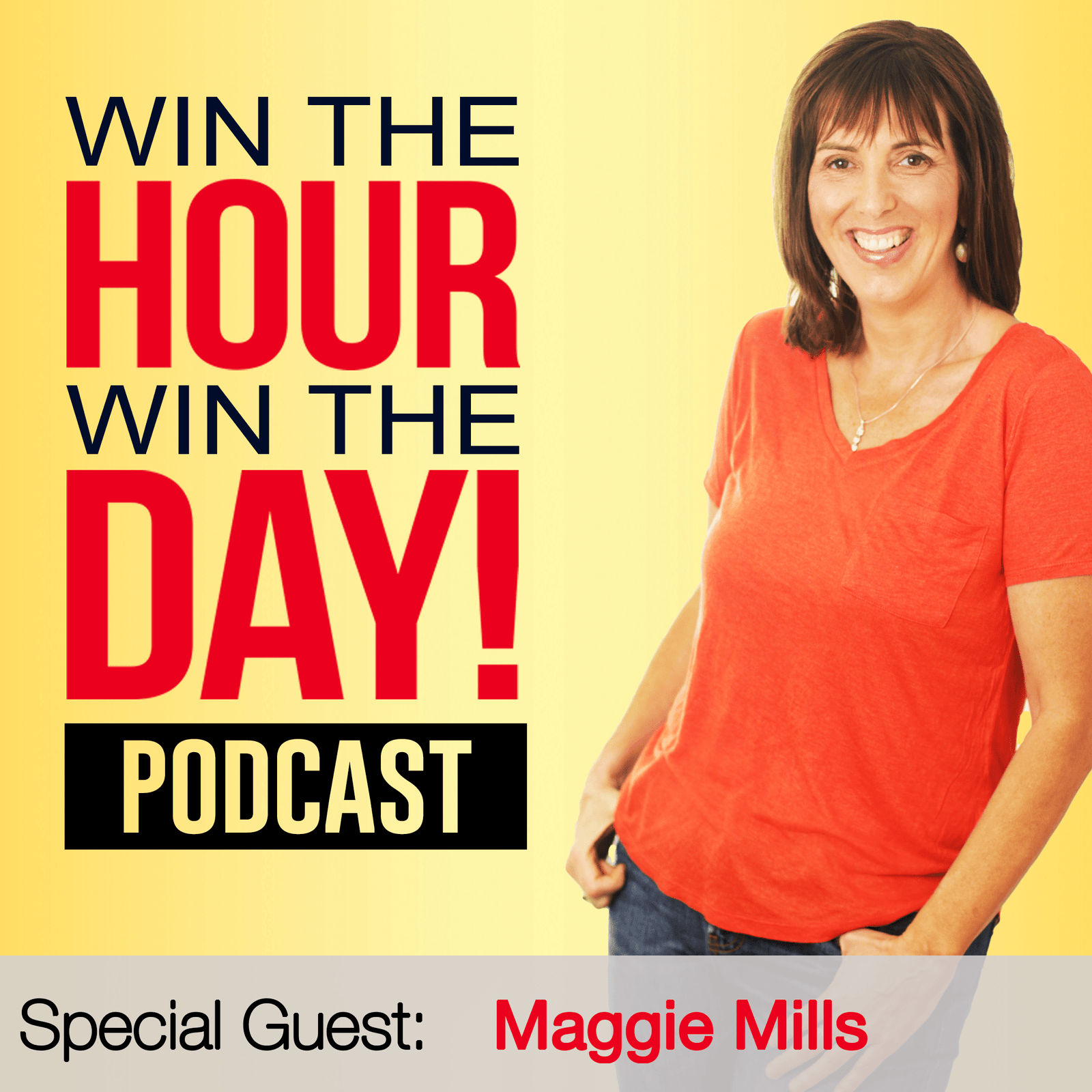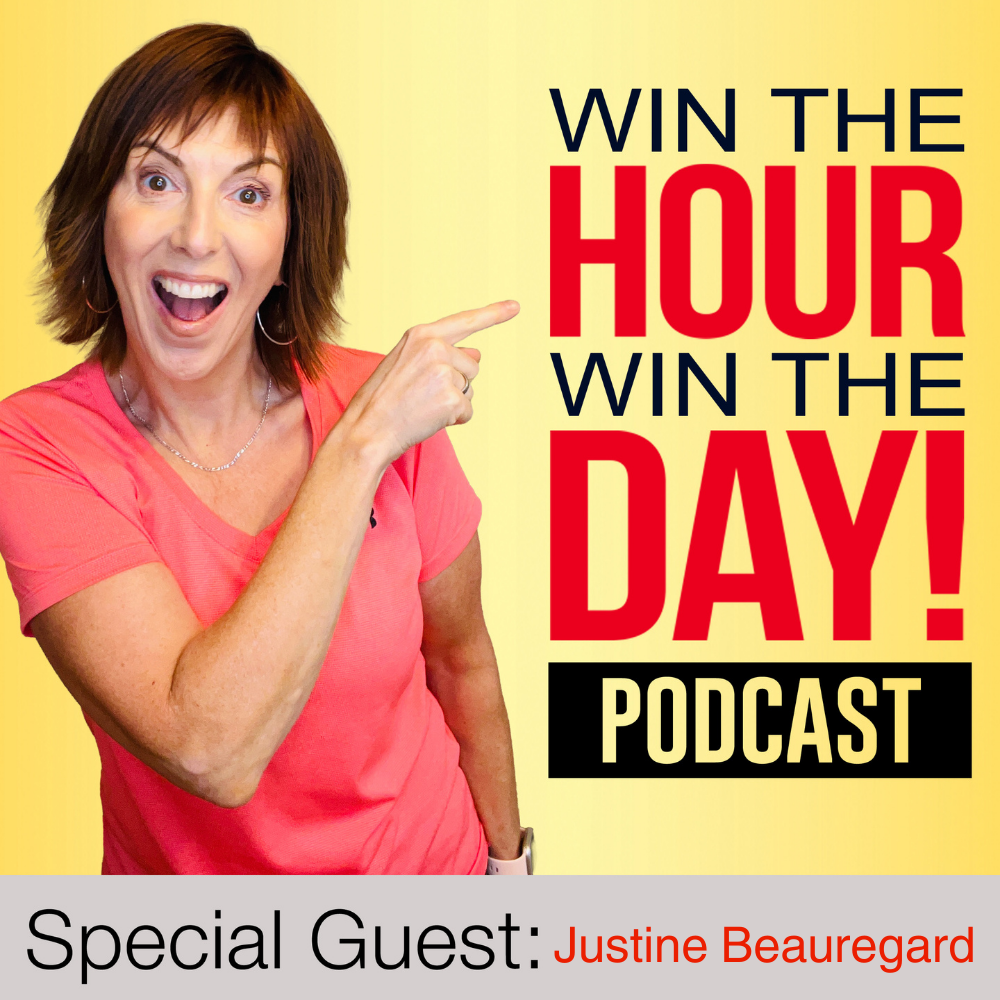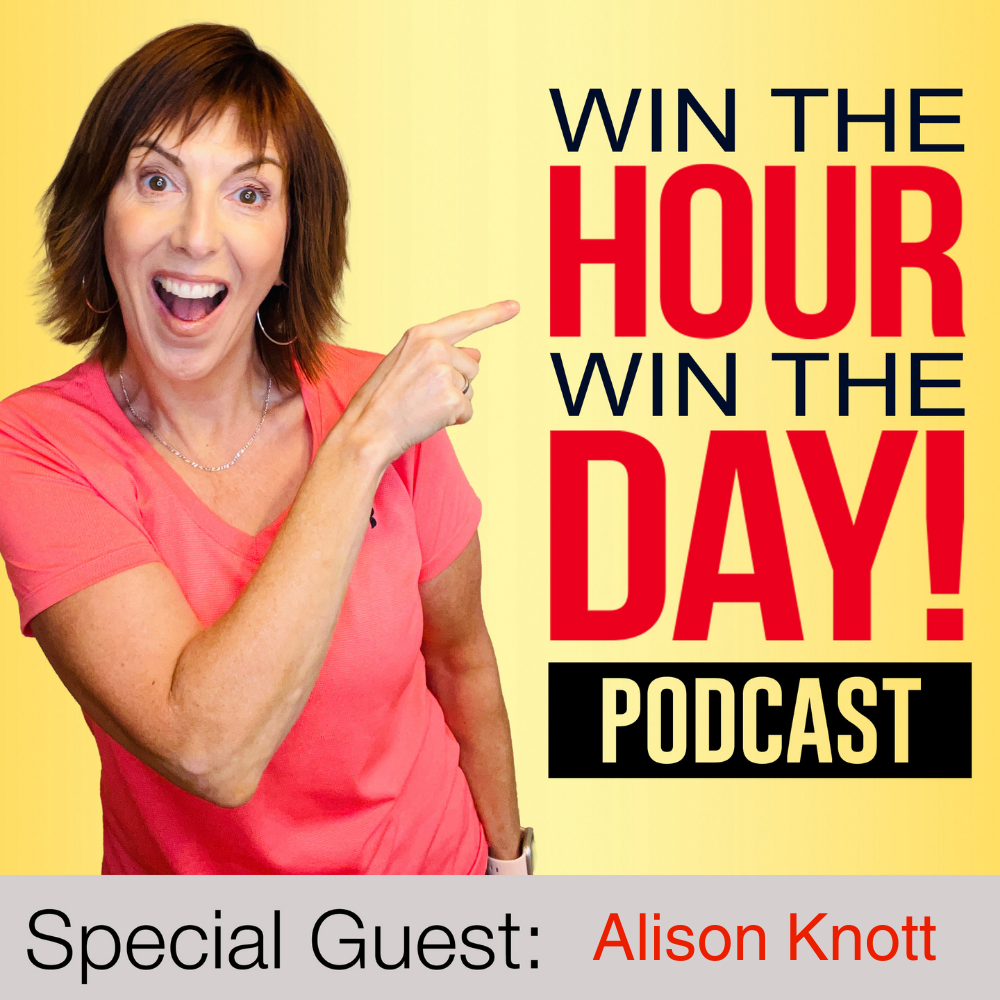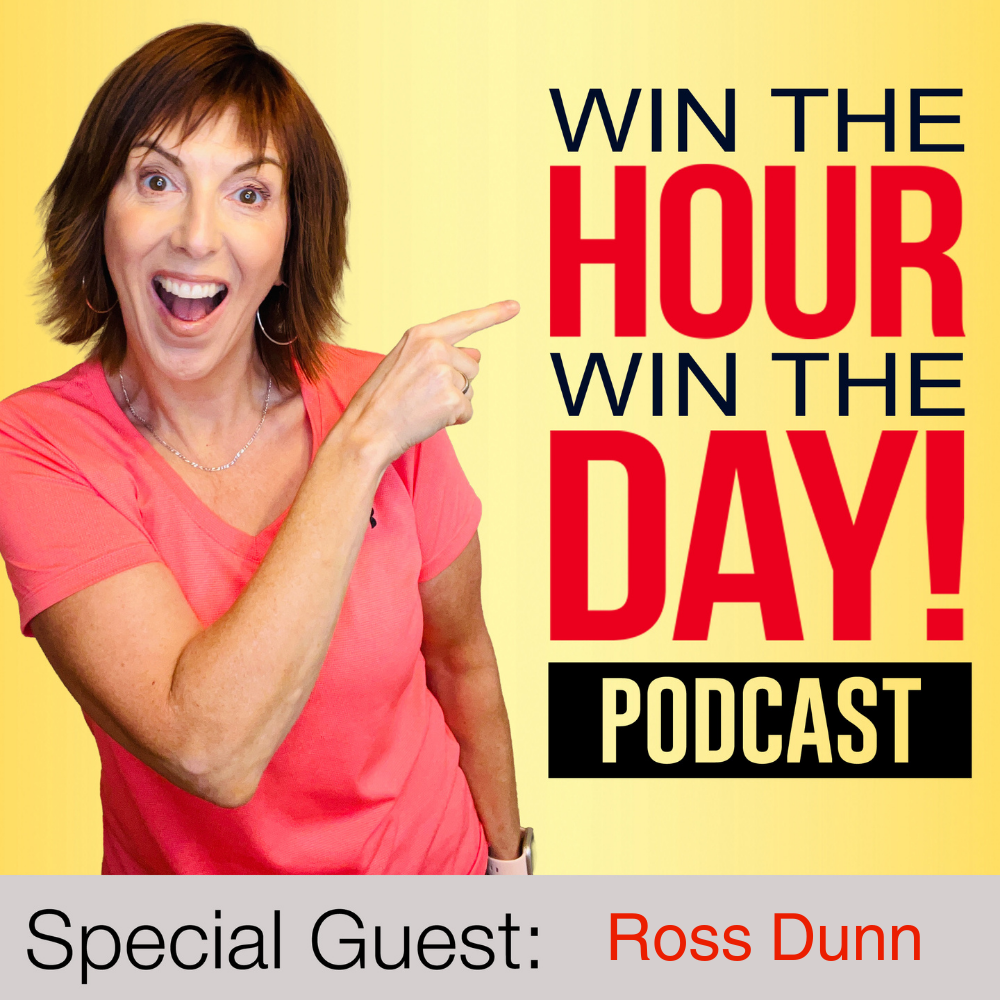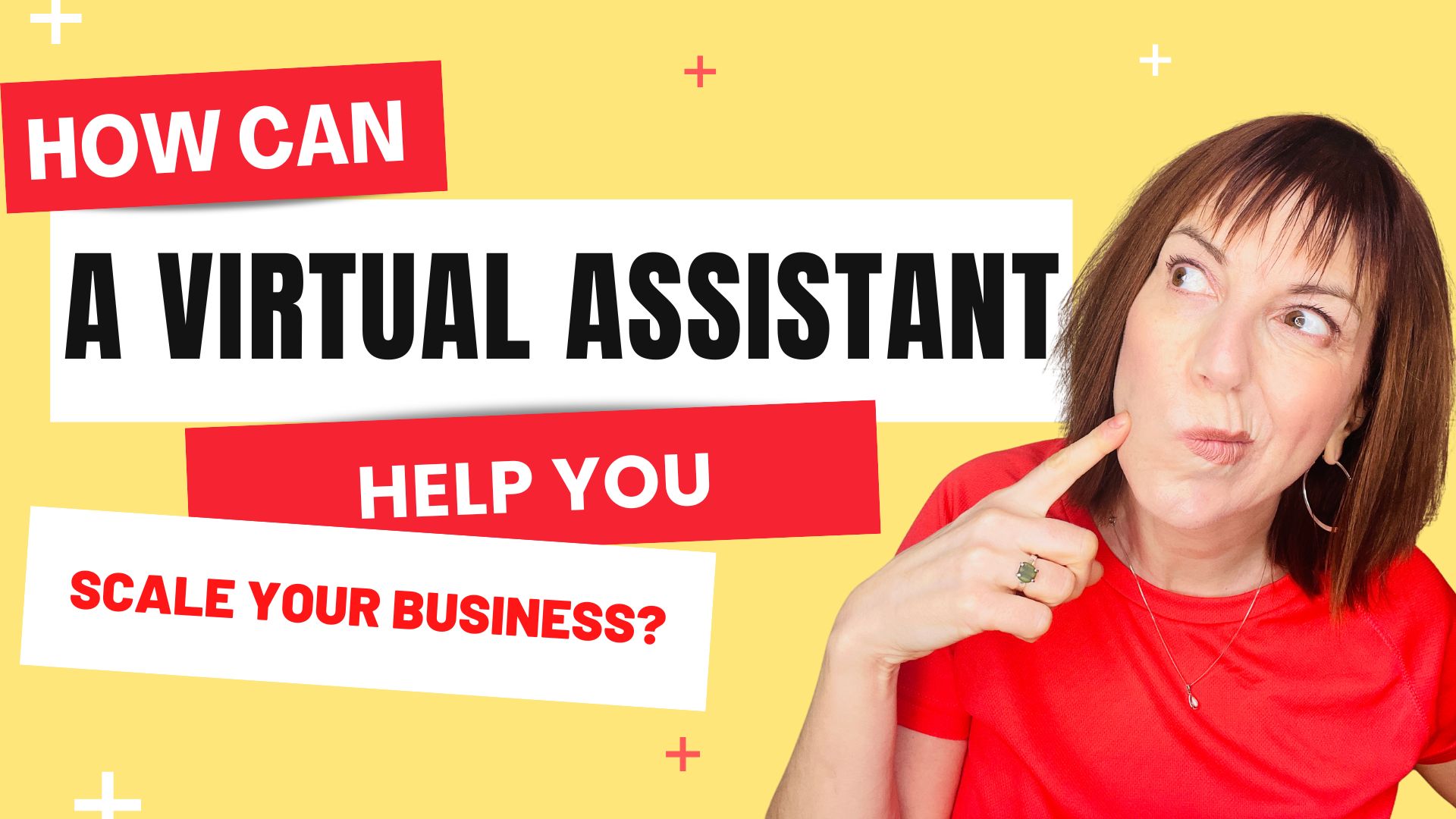Episode Summary
You can find Maggie Mills at:
Website: http://www.takemaggieswordforit.com/
Email: maggie@maggiemills.com
Instagram: https://www.instagram.com/takemaggieswordforit/
LinkedIn: https://www.linkedin.com/in/maggiemillsmarketing/
Win The Hour Win The Day
https://winthehourwintheday.com
Maggie Mills Podcast
[00:06:43]Kris Ward: Hey, everyone. Welcome to another episode of Win The Hour, Win The Day. I am your lucky host, Kris Ward, and today in the house, we have a spectacularly interesting human being, Maggie Mills. All right, here we go. Now she’s got this unique job of being a ghost writer, which I often think
[00:07:06] from my marketing background, how do you embark on that? When you’re a ghost writer? Like the whole thing is you’re not supposed to essentially be seen. Anyhow, Maggie is here and she is going to talk to us about how to make our communication or written communication, more effective and more powerful.
Cause she’s written way more books than I will ever do in a lifetime. Welcome to the show. Maggie.
[00:07:29]Maggie Mills: Hello, Kris, thank you so much for having me. And now I feel a lot of pressure to be even remotely interesting.
[00:07:36]Kris Ward: Oh boy, you guys have gotten to watch the video. It’s like talking to somebody on the cover of Vogue magazine.
[00:07:42] I don’t think anyone’s ever called you dull or boring a day in your life. So, I’m sure you’ll do just fine. Okay. Maggie, you sent me some information and we were talking and it was really interesting to me because there was, you know, things that we shouldn’t be saying in our written dialogue. And I’m sure I do all of them. So why don’t you…
[00:08:03]Maggie Mills: I want you to know that based on others and my mistakes as well. We all do it.
[00:08:12]Kris Ward:So let’s whip down that list. What are some of the most common mistakes we make and why do they matter?
[00:08:19]Maggie Mills: Well, let’s talk about why they matter first. If you don’t mind. Our audience is judging us, even silently. We all like to say, you know, we don’t need to be so prim and proper, and it is true that blogs are not as formal as other writing. However, when you give it your best and things are accurate and they’re easy to read, it sends a subliminal message to people that you know what you’re talking about, and you are a professional and you care about what you’re writing and you’ve spent time on it.
[00:08:54] Now with that being said, we know that there are several different types of writing that, you know, there are white papers. There are blogs, different audiences. And I read this quote years ago with love. Remember where I read it, but the quote is nobody ever bought anything from an English professor.
[00:09:17]Kris Ward: Oh, that I love that because you know what, nothing worse than a Nazi grammar.
[00:09:25] And I think Facebook is the worst for it. Right. And you could even put, oh my heavens don’t even get me started. I, whatever. I had put something up. When there was a passing in my family and there was sort of a tragedy and I was caught letting people, I hadn’t been on it. Somebody told me that corrected my grammar.
[00:09:47] Like this is cool. And it was something I had to let people know because I’m not really great at sharing online about those things. But it was something like, if I don’t, it’s going to be a problem if I don’t mention this and somebody came back and said, and it was it really, I would argue also a typo because it was you and your like your thing.
[00:10:05] So it was just whipping it off and I felt like saying, oh my gosh, I just deleted them. Like, I don’t need you in my life. That’s not the point of the message. So anyhow, there’s my rant. So that’s a really good point because I think it can also cripple us too. When we, back in the day, you know, a while ago, if I put something up and I saw a mistake on it later, I was so mortified and embarrassed because, oh, I went to college and university, whatever, you know, if that’s the mess, if that’s all you notice in my content, then I missed the boat. Anyhow. Right. Why his quote to off to start us off with I interrupted. Continue.
[00:10:40]Maggie Mills: No, no, no. This is not interruption. This is a spontaneous, enthusiastic conversation. And this is what friends do, we get excited. We got. So you’re fine. And don’t apologize. I derail very easily. So the point I want to make, and we’re going to talk about three different things, but before you pick up the pen, before you put your fingers close to that keyboard, what I want to tell everybody who’s writing anything is
[00:11:11] “Write first. Edit later.” And by that, I mean, don’t try to make every sentence perfect. Before you move on to the next sentence, get it all down first, because this desire for perfection just paralyzes people. And that’s why so many people feel like, oh, I can’t, right. It’s not about perfection. And, and you know, being in the business, you are that anything more than a paragraph.
[00:11:42] And in some cases, even that you write once and you edit 5, 10 times. And when you’re writing books, you can edit. I heard 27 times he edited his book.
[00:11:54]Kris Ward: Yeah. You could edit forever, when you just have to let it go. I want to jump in here because as you know, we’re all about not grinding it out and you shouldn’t have to work that hard.
[00:12:02] You know, being in execution mode 60% of the time. So one of the things I found helpful too, is because sometimes in an interview like this, when I’m on another podcast, I would say something. And I’m like, oh my gosh. Like as if I’m, you know, the listener and the speaker, I’m like, I’ve got to write that down because when we talk, we think differently than we sit to write.
[00:12:20] And so what I found helpful is something as simple as in Google docs, you can go up to tools and hit. I think it’s transcription. I can, if you guys don’t see it, reach out to me, I’ll tell you. But you could just hit that button and then I just talk and it could be a sloppy little mess. I’ll just talk for a paragraph.
[00:12:37] And if I don’t want to edit it, somebody in my team could put that into sentences and then I’ll edit it and you sound very different and you don’t have that white page. And then you’re not paralyzed by the typing and trying to therefore make it sound so polished from start to finish. So I find that very helpful as well.
[00:12:56]Maggie Mills: Sure, brilliant, man. I just had that right now. You are brilliant and so much more sophisticated than I am because I keep a notebook in the door pocket of my car for that. Like I had this brilliant idea at the traffic light. I must write it down right away or I will forget it. You bring it.
[00:13:18] Yeah, bring up a really wonderful point. And I recommend this to people all the time. The minute you get that idea, as long as art isn’t in drive, or you’re not in surgery or something. That’s another story, write it down so that you can come back later, record it, which with ever method works best on your phone.
[00:13:37]Kris Ward: So we’re going to write it and edit it, and there’s a way so that it doesn’t seem so hard to start writing. So now, great. We’re moving from that. What do we do next?
[00:13:47]Maggie Mills: Okay. Let’s say you have a document, you’ve written stuff. You know, it’s going to need some cleaning up and set some editing. There’s there’s three things we do.
[00:13:58] We add things, we delete things and then we review. So virtually, every writer, author I’ve worked with, their work benefits from going back and adding some more detail and by detail, I mean, adding quotes, statistics and sensory details. And I’ll riff a little bit on each one of those. When you’re looking for quotes and statistics, avoid confirmation bias, which means I’ve already decided the point I’m going to make.
[00:14:37] And I’m going to find all the numbers that prove my point. And I’m going to these sites on the internet or books I’ve already read that are leaning very strongly in one direction or the other. We all want to do that. We want to be correct. However, you will be seen as more objective and therefore a better source,
[00:15:04] a better thought leader, a more understanding person when you go to several sources and I recommend, I look for a site called, allsides.com. And they’re media biased. They rate all the newspapers and magazines in the US. Are they right-leaning or left-leaning? Are they central? And it’s fascinating to fish through there to see how one story can be written two very different ways. So it’s a very good study on how to write and how to be neutral.
[00:15:47]Kris Ward: That kind of reminds me like when you’re a kid and you know, like I have a sister and you’re like, oh, you want. Yeah, you got to get to your mom to get your like, listen, here’s my side of this right. Now,
[00:15:59] you’re going to hear something very, completely different from the other person. So let me make sure you get my story first so I can see that very juvenile. Okay. Hold on one second. I want to back up here for a second because you brought up a couple really good points. I can’t tell you when I was writing blogs.
[00:16:14] You know, all of a sudden I would trip across a really good quote and I think, oh my gosh, this should be in my blog or I should have some statistics. And it’s great. Now it’s part of our super tool kits, which you guys can reach out and ask me more about that. But that’s how our way of staying in 60% execution mode so that you build consistency on all that stuff.
[00:16:30] So a couple of things there, then we make sure to include them now because they really do add so much weight too, when you’re positioning or mentioning something, versus just like, here’s my opinion. I’m really passionate about it. And this is my business. So of course I say this. Now here, we’ve got some backup, right?
[00:16:47] If I can piggyback on that for a second, when you’re looking for a quote or when you meet a quote or statistic is really not the time you should be looking for it. Right? Because then you’re often this wild goose chase. So my team also, we have this thing. Where once a month, they have to come up. Like it was part of their weekly, monthly duties that, okay, I need five quotes and five statistics so that we build this treasure trove of stuff accumulation versus now I just got, I’ve got this blog, but I need to have this thing to verify it.
[00:17:15] But when you say here’s the important part, if I’m talking about, you know, you can build… you really, at the very least needed an amazing team. Not people think they have a VA, but you need a team to have a business by yourself. It is, you’re just a sufferpreneur. What would be competing or the other side of that, like you’re saying, don’t just get information that verifies that like, I don’t… forgive me for saying this, but if I think this is the only way to do it, it’s kind of right.
And you do need to have a team. Is that just a bad example of how I show both sides of the argument? Do you know what I mean?
[00:17:53`]Maggie Mills: No, no, let me, let’s see how we can delve into this. I look at it like this. Ultimately you do want to prove your point, you’re not going to change your mind. Most likely you, during the exercise, you might see some other points of view.
[00:18:12] Come across good quotes, you know, solidify your position. But the most important point is the credible source. Pretend you have published this and you are now being interviewed about a statement you have made you need to back it up solidly. So is your source a credible source? And I do say don’t let Wikipedia be her only source.
[00:18:43] Okay. Go to an academic source, go to a.gov, something like that. You’re still proving your point. And we know that you can find a statistic to prove anything, we can get your ex-husband was in fact, an alien and you have photographs showing the evidence of the third arm. We can prove it. Okay. So the times, the post or national Inquirer.
[00:19:16]Kris Ward: So I think what you’re saying, source it, make it credible and then make sure that you’re not just so extreme on this is the one and only way to do it.
[00:19:27]Maggie Mills: That’s situational. You’ll understand it as you’re writing it and the caveat I would give.
[00:19:35] Don’t rely. I’m telling you to use quotes and statistics, but don’t rely too heavily on them or make them too long. You know, a sentence, two sentences where I see people going wrong in longer form documents, they’ll throw in paragraph after paragraph, after page, they quote the same book 20 times.
[00:19:55] Oh yeah. I call it stuffing because it looks like. I’m really aware of my word count, and I need to say more here, but I personally have nothing to say. So let me copy these three pages and then you get into the legal issue of how much is it legal to reproduce without seeking permission from the author and publisher. So just be wary of it, sprinkle it, sprinkle it, judiciously.
[00:20:22]Kris Ward: I don’t think for most of the people out there that’s going to necessarily be the problem. I think just even thinking to include them will be the issue. All right. So those are really good points. Now we, you also talked to me about some words.
[00:20:33] We want to be mindful of words. I always say words have power, when I’m more talking about being positive and stuff. So what are some words that we should be eliminating or changing?
[00:20:44]Maggie Mills: Oh, I love this part because this is fun and easy and it makes for some self-awareness, the first thing we’re going to do.
[00:20:55] And you can do it with these searches on your document. Look for any time you have written, I think, or I feel because you’re automatically subtly saying, well, maybe I’m the only person who thinks this or feel you, you just want to state something as the fact, the Dow Jones industrial average took a tank this week and it’s impacting whatever.
[00:21:27] I know nothing about finance, you know, very misstated don’t go I think, I feel and consider this when you’re speaking as well. A lot of people tend to do “the, so” go back and search for that. There will be those rare occasions when you really need to use, “I think”, or “I feel it” is appropriate, but if you can remove it.
And people are worried about stating something as fact stated as fact, you’ve had your three quotes and your four statistics to back it up.
[00:21:59]Kris Ward: Okay. So hold on. These are two really powerful things here. So first of all, now you just went up to me cause I’m like, oh, I know, when I… my book was being edited, there were a couple of patterns I saw.
[00:22:09] Like I apparently start a lot of sentences with, so, so.. the reason. It’s on the list. Yeah. So as I start my new sentence, I never even thought of doing a search in the document to see how many times that word pops up. Like I’m looking for it. Okay. So do the search in the document. That’s fantastic. Then,
[00:22:29] I never thought of that. I mean, I do always think when you hear somebody saying. You know, oh, I love like when you hear a politician and they’ll read something like I feel, and then they have to read the speech. Well, if you felt that strongly, you shouldn’t have to read it. But for me, I often say, I believe that your business should support your life instead of consuming it.
But I guess, a stronger statement if I took the, “I believe “out like your business should support your life instead of consuming it, like, is that an example?
[00:23:00]Maggie Mills: You know what? I like that your “business should”, as opposed to, “I believe” because some of the subtleties of marketing, you are now making it about me and not you, you’re not presenting to me your business ethic or the reason why you’re in business.
[00:23:17] You’re giving me information. That’s going to help me. You’re starting off with your business. Maggie, your business is going to benefit from the next three things I’m going to tell you.
[00:23:29]Kris Ward: Right. Okay. Oh my gosh, everybody. I gotta lay down. Okay.
[00:23:34]Maggie Mills: I mean that works for your mission and vision statement, you’ve written anyway.
[00:23:39]Kris Ward: I think it works on so many levels. That’s the thing is I just thought it was, I don’t know, an introduction to an idea. So that’s almost like I said, I believe, and then you’ll listen to me, but you’re right. If I take that out, first of all, it’s not just my opinion. It really is what business should be. So it would be stronger. And then you’re right.
[00:23:55] As a marketing message background that I have, when I say your business, now my marketing goes right to you. It’s in your ownership versus here’s my story. And then I hand it over to you. “I believe your business.” Like it’s a trend, it’s just water down. Right? Okay. These are really little teeny things, but I can see how they make such a difference.
[00:24:15]Maggie Mills: Yeah. Many things. And there are things we don’t notice and we’ve talked about… And I’m so guilty of that. Do it all the time. I have to search for that. Here’s another fun word to consider.. “Just”.. I’d say it’s just a little trip up the street. It minimizes things, makes it smaller.
[00:24:40] It makes your opinions smaller. It’s like saying it’s just a four hour surgery that requires morphine afterwards.
[00:24:55]Kris Ward: Oh, my gosh. Okay. All right.
[00:24:58]Maggie Mills: Yeah, no problem.
[00:25:01]Kris Ward:Okay. All right. Sorry everybody. Why don’t you, I’m actually now looking at the ceiling list, like thinking, you know, I’m like, I’m doing a show up. Pay attention. Okay. So you can take your talking. Cause I just do note there. I was like, oh my gosh. How many times do I say that?
[00:25:15] You know, I have not heard anything like this before, you hear all the big stuff. And I know. Kind of, I think I know the word, but negates whatever you just said. So I’ve heard that before. Like, I love you but.. you know, your business is a success but, so whatever you just said is now negated when you use the word, but so I’ve heard those mainstream ones, but these other ones that you’re saying, just, I thought they were, they added a more conversational, softer tone.
[00:25:41] So it wasn’t like in your face sales, but you’re right. The points you’re making really are powerful ones. Okay. Let me get out of your way. What are some other words?
[00:25:51]Maggie Mills:Here’s another fun one. Can you tell, I love what I do. Oh my gosh. See this all the time again, guilty. You know, whatever it is, I’m guilty.
[00:26:01] If I ever run for office, I’ll just tell people ahead of time, whatever you think I’ve done. I probably did. So let’s just get it out of the way now. Whatever. Yes. Great. She’s a great speaker. Sign up for this great conference. It’s going to be a great day. I appreciate the enthusiasm, but let’s take that apart a little bit and examine it.
[00:26:30] What makes her a great speaker? Is she engaging? Does she talk about experiences from her own life that make you connect with her? Does she give you three things to walk away with? Talk about. Why is it great? Why is it a great conference? Because it’s being offered in Costa Rica and you get to go swimming every afternoon.
[00:26:55]Kris Ward: So you’re saying it’s like a cop-out, it’s a one bucket film.
[00:26:59]Maggie Mills: Yeah, see it a lot in blog posts or like social media posts, excuse me, because they’re shorter. Even in social media posts, when you’re talking to them about very limited number of words for Instagram or Twitter or whatever, you can swap it out pretty quickly with something more dynamic.
[00:27:19] It’s exciting. It’s in depth, you know, that works for business in depth. It’s detailed. Every time you see the word. Great. Just ask yourself “why” you don’t have to go into a lot of detail.
[00:27:35]Kris Ward: Yeah. I’ve heard people complain about that with the word, “Amazing”, too. Like everything, everything can be amazing. Right. So I think the less… yeah.
[00:27:43] Awesome. Amazing. So I think your point here is we just get sloppy and then we rely on 10 words like that whole 80-20 rule that now we’re using, you know, 20% of words, 80% of the time, I guess, is what you’re concerned about.
[00:28:01]Maggie Mills: Yeah. Yeah.
[00:28:03]Kris Ward: Okay. All right. That makes sense. Okay.
[00:28:06]Maggie Mills: Oh wait. You can make your posts a little more interesting.
[00:28:09]Kris Ward: Okay. So make it more interesting. Alright. Oh, speaking of interesting, man, the time is flying by here. We just have a couple minutes left. What’s one of the final things you would like us to be mindful of as we move forward? Because you really have opener evoke my eyes for sure.
[00:28:25]Maggie Mills: The importance of editing. It’s always saved for last. We know we should read it before we send it. And the time you have to edit and review, of course we know it’s different for every project. There are times when you absolutely must get that email out by five o’clock today. Whenever you can, pause. Close the document, come back to it later, any type of break you can take and the larger your document, the longer you should spend away from it and then come back to it.
[00:29:01] And there are several things you can do rather than just reading through. We do not see our own mistakes. If you have to look at, review it by yourself. Read it out loud. That helps you to pick up missing words, a little jumps in logic, getting from one point to the other, you can record it on your phone.
[00:29:23] You can videotape yourself delivering it whenever you can, give your work to somebody else to read. Now, take it with a grain of salt because your friends are going to go. It’s great. I love it.
[00:29:37]Maggie Mills: Yeah. So those are really good points. That’s something I do is so what I would do is I’d definitely try to leave it and come back with fresh eyes. As much as I hate reading things out loud, I find it labor intensive and I just, whatever, I don’t enjoy it, but I do it. Cause you start to hear the words you’re stumbling on.
[00:29:52] So you realize, well, the sentences and flow. If I am stumbling on it, And then we call it an audit here. So what happens is let’s say we’re working on the website or a blog is going to go up or something. So then one or two other people on the team have to read it and we just call it an audit. I’m not really looking for you to necessarily check my grammar at that point.
[00:30:11] You know, even if somebody doesn’t deem to be a writer or, you know, even if English isn’t even their first language, when they’re reading it. As they audit, they realize, Kris, you totally missed a word here. Like, you know, the missing of the words or the foolish foolish mistakes, but hurt the most.
[00:30:26] Right. So even having somebody else, what we call audit it is just every time I know there’s a saying something like, there’s no better spell check or there’s no better proofreading, no better proofreading until you hit the, “pay the printer,” something like that until you hit the send button.
[00:30:41] Right? Oh, so clear. Right. You’ve paid for it. So, that’s what we try to do. Okay. Fantastic! Boy oh boy, time flew by. Maggie, where can people find more of your brilliance?
[00:30:57]Maggie Mills: Oh, show up on my doorstep. We’ll have cocktails. Everybody comes over. I feed them. I had systolic food. It’s everything to me. maggie@maggiemills.com.
[00:31:08] You can send me an email. I read them. I answer them. I’m one social. I love social. I know I shouldn’t, you know, I’m the demographic who should be getting I’m not on Facebook, but I am, look me up. I’m really, alarmingly friendly
[00:31:27]Kris Ward: And quite a delight. Oh my heavens! Thank you so much for your wisdom, your time and your energy and everybody else. We will see you in the next episode. Thanks so much.
[00:31:32]Maggie Mills: Oh you’ve been so wonderful. Thank you for being such a delightful host and so welcoming. I appreciate it.
END[00:31:41] Kris Ward: Oh, thank you so much. [00:31:43]

